Did you know that fermented cabbage, also known as sauerkraut, offers a multitude of health benefits that can improve your overall well-being? This traditional German food is not only delicious but also packed with nutrients that can support digestion, boost the immune system, aid in weight loss, and even potentially reduce the risk of cancer. Plus, it’s easy to make at home with just a few simple ingredients!
Key Takeaways:
- Fermented cabbage, or sauerkraut, is a nutrient-rich food that provides essential vitamins, minerals, and probiotics.
- The probiotics in sauerkraut promote a healthy gut flora, aid in digestion, and improve nutrient absorption.
- Sauerkraut supports the immune system, aids in weight loss, and may have positive effects on mental health.
- Compounds in sauerkraut, such as sulforaphane, have been shown to have potential cancer-preventive properties.
- Sauerkraut can contribute to heart health and bone strength, thanks to its fiber content and vitamin K2.
Nutritional Value of Sauerkraut
When it comes to nutrition, sauerkraut is a powerhouse. This fermented cabbage dish is not only delicious but also packed with essential nutrients that promote overall health. Let’s take a closer look at the nutritional profile of sauerkraut.
| Nutrient | Amount |
|---|---|
| Calories | 27 |
| Fat | 0.2 grams |
| Carbohydrates | 6.1 grams |
| Fiber | 4.1 grams |
| Protein | 1.3 grams |
| Sodium | 780 milligrams |
| Vitamin C | 23% of the Recommended Daily Intake (RDI) |
| Vitamin K1 | 28% of the RDI |
| Iron | 10% of the RDI |
| Manganese | 10% of the RDI |
| Vitamin B6 | 7% of the RDI |
| Folate | 6% of the RDI |
| Copper | 5% of the RDI |
| Potassium | 4% of the RDI |
The fermentation process in sauerkraut not only enhances its flavor but also increases its nutritional value. Compared to fresh cabbage or coleslaw, sauerkraut is a more nutritious option, providing a range of vitamins, minerals, fiber, and probiotics.
The Benefits of Key Nutrients in Sauerkraut
Sauerkraut’s nutritional content offers a multitude of benefits for your health:
- The high vitamin C content in sauerkraut supports the immune system and helps protect against common illnesses.
- Vitamin K1 promotes blood clotting and contributes to bone health.
- Iron is essential for transporting oxygen throughout the body and preventing anemia.
- Manganese aids in metabolizing carbohydrates, cholesterol, and amino acids.
- Vitamin B6 supports brain development, hormone production, and the immune system.
- Folate is crucial for DNA synthesis, red blood cell production, and fetal development during pregnancy.
- Copper plays a role in energy production, iron metabolism, and the formation of connective tissues.
- Potassium is important for maintaining proper heart function and regulating blood pressure.
Incorporating sauerkraut into your diet can help you meet your recommended daily intake of these essential nutrients, contributing to your overall well-being.
Digestive Benefits of Sauerkraut
When it comes to promoting a healthy digestive system, sauerkraut is an excellent choice. This fermented cabbage dish contains probiotics that can support the growth of beneficial gut bacteria and improve digestion.
Probiotics are living microorganisms that have been shown to have numerous health benefits, particularly for the gut. In sauerkraut, these probiotics help maintain a balanced gut flora, which is essential for optimal digestive functioning.
Sauerkraut’s probiotics, such as lactobacilli and bifidobacteria, aid in the breakdown of food and assist in the absorption of nutrients. By improving nutrient absorption, sauerkraut ensures that your body can fully utilize the vitamins, minerals, and other essential compounds present in the foods you consume.
“The probiotics present in sauerkraut promote the growth of healthy gut bacteria and aid digestion.”
Sauerkraut is also a rich source of enzymes that facilitate the digestive process. Enzymes play a critical role in breaking down complex molecules into simpler forms that can be easily absorbed by the body. With the help of sauerkraut’s enzymes, your digestive system can efficiently process the food you eat, reducing the risk of indigestion and related discomforts.
Improved Gut Health
Consuming sauerkraut regularly can contribute to improved overall gut health. The combination of probiotics and enzymes in sauerkraut helps maintain a balanced gut microbiome, limiting the growth of harmful bacteria while supporting the growth of beneficial ones.
When the microbial balance in the gut is disturbed, it can lead to various digestive issues, such as bloating, gas, and diarrhea. By regularly incorporating sauerkraut into your diet, you can keep your gut flora in harmony and minimize the risk of experiencing these unpleasant digestive symptoms.
Sauerkraut is particularly beneficial for individuals with conditions like irritable bowel syndrome (IBS) or inflammatory bowel disease (IBD). The probiotics in sauerkraut can help alleviate symptoms associated with these conditions and provide relief for a sensitive digestive system.
Aiding Digestion and Improving Nutrient Absorption
The enzymes present in sauerkraut help break down complex carbohydrates, proteins, and fats into smaller, more easily digestible molecules. As a result, sauerkraut aids in the digestion of a wide range of foods, preventing digestive discomfort and nutrient malabsorption.
The improved digestion and nutrient absorption provided by sauerkraut can have a significant impact on overall health. When your body efficiently breaks down and absorbs nutrients, you may experience increased energy levels, better immune function, and improved overall well-being.
To sum up, sauerkraut’s probiotics and enzymes offer valuable digestive benefits. By promoting a healthy gut microbiome, aiding digestion, and enhancing nutrient absorption, sauerkraut supports optimal digestive functioning and contributes to overall gut health.
Immune-Boosting Properties of Sauerkraut
Sauerkraut is not just a tangy and delicious addition to your meals; it also plays a significant role in boosting your immune system. The probiotics found in sauerkraut support a healthy gut flora, which in turn helps prevent the growth of harmful bacteria. This contributes to a stronger immune response and reduces the risk of infections.
The probiotics in sauerkraut also assist in the production of natural antibodies, which play a crucial role in fighting off pathogens and foreign invaders. By promoting the growth of these antibodies, sauerkraut helps strengthen your body’s defense mechanisms.
Furthermore, sauerkraut is a rich source of vitamin C and iron, both of which are essential for a healthy immune system. Vitamin C is known for its antioxidant properties and its ability to support immune cell function. Iron, on the other hand, is necessary for the production of red blood cells, which help carry oxygen to different parts of the body, including the immune cells.
Benefits at a Glance:
- Supports a healthy gut flora
- Prevents the growth of harmful bacteria
- Promotes the production of natural antibodies
- Rich in vitamin C and iron
Immune-Boosting Nutrients in Sauerkraut
| Nutrient | Amount per Serving (1 cup) |
|---|---|
| Vitamin C | 23.5 mg |
| Iron | 0.77 mg |
Through its probiotic content, vitamin C, and iron, sauerkraut provides a natural boost to your immune system. By incorporating sauerkraut into your diet, you can support your body’s defenses and enjoy the numerous health benefits it offers.
Role of Sauerkraut in Weight Loss
Sauerkraut can be a valuable addition to a weight loss diet due to its low-calorie and high-fiber content. The combination of these factors makes sauerkraut a satisfying and nutritious food that can support your weight loss goals.
Fiber: Sauerkraut is rich in fiber, which is known to promote feelings of fullness and reduce calorie intake. By adding sauerkraut to your meals, you can increase your fiber intake, helping you feel satisfied for longer and potentially consume fewer calories overall.
Probiotics: In addition to its fiber content, sauerkraut also contains beneficial probiotics. These live microorganisms can contribute to weight loss by enhancing digestion and potentially reducing fat absorption. While more research is needed to fully understand the impact of sauerkraut’s probiotics on weight loss, their presence adds to the overall health benefits of this fermented food.
If you’re looking to incorporate sauerkraut into your weight loss journey, consider the following:
- Choose low-sodium options: Some store-bought sauerkraut varieties can be high in sodium. Opt for low-sodium or homemade sauerkraut to reduce your salt intake.
- Pair sauerkraut with lean protein: Enjoy sauerkraut as a side dish or topping for lean protein sources like grilled chicken or fish. This combination provides a satisfying and nutrient-rich meal.
- Experiment with recipes: Sauerkraut can add a tangy flavor and crunch to a variety of dishes. Try incorporating it into salads, wraps, or grain bowls to enhance the nutritional value and taste of your meals.
Remember that while sauerkraut can be a beneficial component of a weight loss plan, it should be consumed as part of a balanced diet and healthy lifestyle. Consulting with a healthcare professional or registered dietitian can provide personalized guidance on incorporating sauerkraut into your weight loss journey.
Mental Health Benefits of Sauerkraut
The gut-brain connection is becoming increasingly recognized, and sauerkraut’s probiotics may play a role in improving mood and brain function. Probiotics have been shown to have positive effects on mood, memory, and symptoms of anxiety, depression, and other mental health conditions.
Additionally, sauerkraut promotes the absorption of mood-regulating minerals such as magnesium and zinc.
Incorporating sauerkraut into your diet can potentially provide the following mental health benefits:
- Improved mood regulation
- Enhanced memory function
- Reduced symptoms of anxiety and depression
- Support for overall mental well-being
By consuming sauerkraut regularly, you can harness the power of its probiotics and essential minerals to support your mental health.
“The probiotics in sauerkraut have been shown to have positive effects on mood, memory, and symptoms of anxiety and depression. Including sauerkraut in your diet can be a simple and delicious way to support your mental well-being.”
Comparison of Sauerkraut and Mental Health
Mental Health Benefits Sauerkraut Improved mood regulation ✓ Enhanced memory function ✓ Reduced symptoms of anxiety and depression ✓ Support for overall mental well-being ✓ As demonstrated in the comparison table, sauerkraut provides various mental health benefits, making it a valuable addition to your diet.
Potential Cancer-Preventive Properties of Sauerkraut
When it comes to sauerkraut, its benefits extend beyond digestion and immune health. The compounds found in sauerkraut, including the powerful antioxidant sulforaphane, have been found to possess anti-cancer properties.
Sulforaphane, along with various other beneficial plant compounds present in sauerkraut, may play a role in inhibiting the growth of precancerous cells and protecting against different types of cancers. Research suggests that sauerkraut’s potential cancer-preventive effects could extend to breast, colon, liver, pancreatic, prostate, and gastrointestinal cancers.
It’s important to note, however, that further research is needed to fully understand the extent of sauerkraut’s role in cancer prevention. While sauerkraut shows promise in this area, it should not be regarded as a standalone treatment or substitute for professional medical advice.
The Power of Antioxidants
Sauerkraut owes its potential cancer-preventive properties to the presence of antioxidants like sulforaphane. Antioxidants are substances that help protect the body’s cells from damage caused by free radicals, unstable molecules that can contribute to the development of various diseases, including cancer. By neutralizing these free radicals, antioxidants play a crucial role in maintaining overall health and well-being.
I believe in the power of natural compounds, and sauerkraut’s antioxidant-rich profile is an excellent addition to a healthy diet.” – Dr. Sarah Thompson, Oncologist
Exploring Sulforaphane
Sulforaphane, specifically present in cruciferous vegetables like sauerkraut, has gained attention for its potential cancer-preventive effects. Studies have shown that sulforaphane exhibits anti-inflammatory, detoxifying, and anti-carcinogenic properties.
In laboratory studies, sulforaphane has demonstrated the ability to inhibit the growth of cancer cells and induce apoptosis, a process through which damaged or abnormal cells self-destruct. These findings have sparked interest in further exploring sulforaphane’s potential as a natural cancer-fighting compound. While the results are promising, more research is needed to fully understand how sulforaphane works and its precise impact on cancer prevention.
Adding Sauerkraut to Your Diet
Integrating sauerkraut into your diet can be a delicious and nutritious way to potentially support cancer prevention. The array of beneficial plant compounds, including sulforaphane, found in this fermented cabbage dish makes it an excellent addition to meals.
Consider using sauerkraut as a tangy topping for salads, sandwiches, or wraps. You can also enjoy it as a flavorful side dish or a versatile ingredient in various recipes, such as sauerkraut soup or sauerkraut-stuffed pierogies. Just remember to opt for unpasteurized sauerkraut to maximize its probiotic and nutrient content.
While sauerkraut’s cancer-preventive properties show promise, it’s crucial to maintain a balanced and varied diet that includes a range of fruits, vegetables, whole grains, and lean proteins. If you have concerns about cancer prevention or any other health issues, consult with a healthcare professional for personalized advice and guidance.
Heart-Healthy Benefits of Sauerkraut
Sauerkraut, with its fiber-rich composition and probiotic properties, offers heart-healthy benefits that can contribute to a healthier cardiovascular system.
The fiber content in sauerkraut plays a crucial role in maintaining healthy cholesterol levels. Dietary fiber helps reduce levels of low-density lipoprotein (LDL) cholesterol, often referred to as “bad” cholesterol, while increasing levels of high-density lipoprotein (HDL) cholesterol, known as “good” cholesterol. By promoting a balanced cholesterol profile, sauerkraut aids in the prevention of heart disease and supports overall heart health.
Additionally, sauerkraut’s probiotic content may have a modest but positive impact on blood pressure. Probiotics are beneficial bacteria that contribute to the health and functioning of the digestive system. Studies have suggested that certain strains of probiotics may help lower blood pressure levels, potentially reducing the risk of hypertension and cardiovascular diseases.
Furthermore, sauerkraut is a natural source of vitamin K2, a nutrient known for its role in heart health. Vitamin K2 helps prevent the accumulation of calcium in the arteries, reducing the risk of arterial calcification. By maintaining flexible and unobstructed arterial walls, sauerkraut’s vitamin K2 content contributes to the prevention of heart disease and promotes overall cardiovascular well-being.
To summarize, sauerkraut, with its fiber, probiotics, and vitamin K2, offers heart-healthy benefits that include maintaining healthy cholesterol levels, potentially reducing blood pressure, and preventing arterial calcification. By incorporating sauerkraut into your diet, you can support your cardiovascular health and take a proactive step towards a healthier heart.
- https://www.ncbi.nlm.nih.gov/pmc/articles/PMC5489405/
- https://www.ncbi.nlm.nih.gov/pmc/articles/PMC7401973/
- https://pubmed.ncbi.nlm.nih.gov/30516514/
Bone-Strengthening Benefits of Sauerkraut
When it comes to maintaining strong and healthy bones, sauerkraut can be a valuable addition to your diet. One of the key nutrients found in sauerkraut is vitamin K2, which plays a critical role in bone health. Vitamin K2 activates proteins that bind to calcium, promoting its proper absorption and utilization by the bones. This, in turn, helps to build stronger and denser bones, reducing the risk of fractures and osteoporosis.
Several studies have suggested that vitamin K2 supplementation can improve bone health, but sauerkraut provides a natural dietary source of this essential nutrient. Regular consumption of sauerkraut may contribute to maintaining optimal bone density and reducing the risk of bone-related conditions.
Calcium Absorption and Vitamin K2
Calcium is a vital mineral for bone health, but its absorption and utilization in the body require the presence of vitamin K2. Vitamin K2 helps direct calcium away from soft tissues, such as arteries, and delivers it to the bones, where it is needed most. Without adequate vitamin K2 levels, calcium may accumulate in the wrong places, leading to increased cardiovascular risks and decreased bone density.
Sauerkraut’s vitamin K2 content enhances the absorption of calcium, ensuring it is utilized effectively by the bones. By including sauerkraut in your diet, you can optimize the benefits of dietary calcium for bone health.
| Nutrient | Serving Size | Amount |
|---|---|---|
| Vitamin K2 | 1 cup (142g) | 15.6 mcg |
| Calcium | 1 cup (142g) | 38 mg |
Note: The nutrient values provided above are approximate and may vary depending on the brand of sauerkraut.
As shown in the table, sauerkraut contains a moderate amount of vitamin K2 per serving. While it may not be the primary source of this nutrient in your diet, it can still contribute to your overall vitamin K2 intake when combined with other foods rich in vitamin K2, such as fermented dairy products and certain meats.
It’s important to note that more research is needed to fully understand the specific benefits of sauerkraut’s vitamin K2 content for bone health. However, including sauerkraut as part of a well-balanced diet can provide additional support for maintaining strong and resilient bones.
Shopping for Sauerkraut and Making Your Own
When it comes to enjoying the tangy and nutritious goodness of sauerkraut, you have two options: buying it or making your own. Let’s explore the best ways to get your hands on this fermented delight and ensure its quality.
Choosing Store-Bought Sauerkraut
When buying sauerkraut, opt for unpasteurized varieties that are stored in the refrigerated section. These unpasteurized sauerkraut options retain the beneficial probiotics that aid in digestion and support a healthy gut flora.
Take a close look at the ingredient list and avoid sauerkraut with added preservatives or sugar. You want the real deal – sauerkraut that has been traditionally fermented with only cabbage and salt.
Making Your Own Homemade Sauerkraut
If you prefer a hands-on approach and want to experience the satisfaction of crafting your own sauerkraut, fear not. It’s a simple and rewarding process that requires only a few ingredients and some patience.
Start by sterilizing your fermenting equipment, such as jars or crocks, to ensure a clean environment for fermentation. You can use boiling water or sanitize with a food-grade cleaner.
Next, select fresh cabbage and a high-quality non-iodized salt, as iodized salt may hinder the fermentation process. Shred the cabbage finely, mix it with salt, and allow it to sit for some time until it releases enough liquid to submerge the cabbage fully.
Pack the cabbage tightly into your chosen fermentation vessel, making sure to eliminate any air pockets. Cover the cabbage with a fermentation weight to keep it submerged in its own brine. Seal the vessel and let it ferment at a controlled temperature for the recommended duration.
Essentials for Homemade Sauerkraut Preparation
When preparing your own sauerkraut, the key is to follow essential guidelines. These include:
- Proper sterilization of equipment to minimize the risk of harmful bacteria.
- Carefully adhering to fermentation times and temperatures to achieve the desired flavor and texture.
- Regularly monitoring the fermentation process and ensuring that the cabbage stays submerged in its brine.
With these steps in mind, you’ll be rewarded with a batch of homemade sauerkraut that is fresh, flavorful, and rich in probiotics to support your gut health.
Now that you are equipped with the knowledge of buying or making sauerkraut, you can indulge in its tangy and nutritious goodness whenever you please. Whether you choose to purchase it from a trusted source or enjoy the process of crafting your own, sauerkraut is a versatile addition to your culinary repertoire. Embrace the art of sauerkraut and savor the benefits it brings to your health and well-being.
Conclusion
Sauerkraut, also known as fermented cabbage, is a versatile and delicious food that provides numerous health benefits. With its rich nutrient profile and probiotic properties, sauerkraut supports digestion, boosts the immune system, aids in weight loss, promotes mental health, potentially reduces the risk of cancer, contributes to heart health, and strengthens bones. Whether you choose to make it at home or purchase it from a trusted source, sauerkraut is an excellent addition to your diet for improved overall health.
One of the key advantages of sauerkraut is its probiotic content, which promotes the growth of healthy gut bacteria and aids digestion. The presence of probiotics enhances nutrient absorption and helps maintain a balanced gut flora. Additionally, sauerkraut is low in calories but high in fiber, making it a beneficial choice for individuals looking to manage their weight. The fiber content also promotes feelings of fullness and supports optimal digestion.
Furthermore, sauerkraut contains important vitamins and minerals such as vitamin C, vitamin K1, iron, manganese, and potassium. These nutrients play crucial roles in supporting immune function, maintaining heart health, and strengthening bones. By adding sauerkraut to your meals, you can enjoy a flavorful and nutrient-dense food that contributes to your overall well-being.

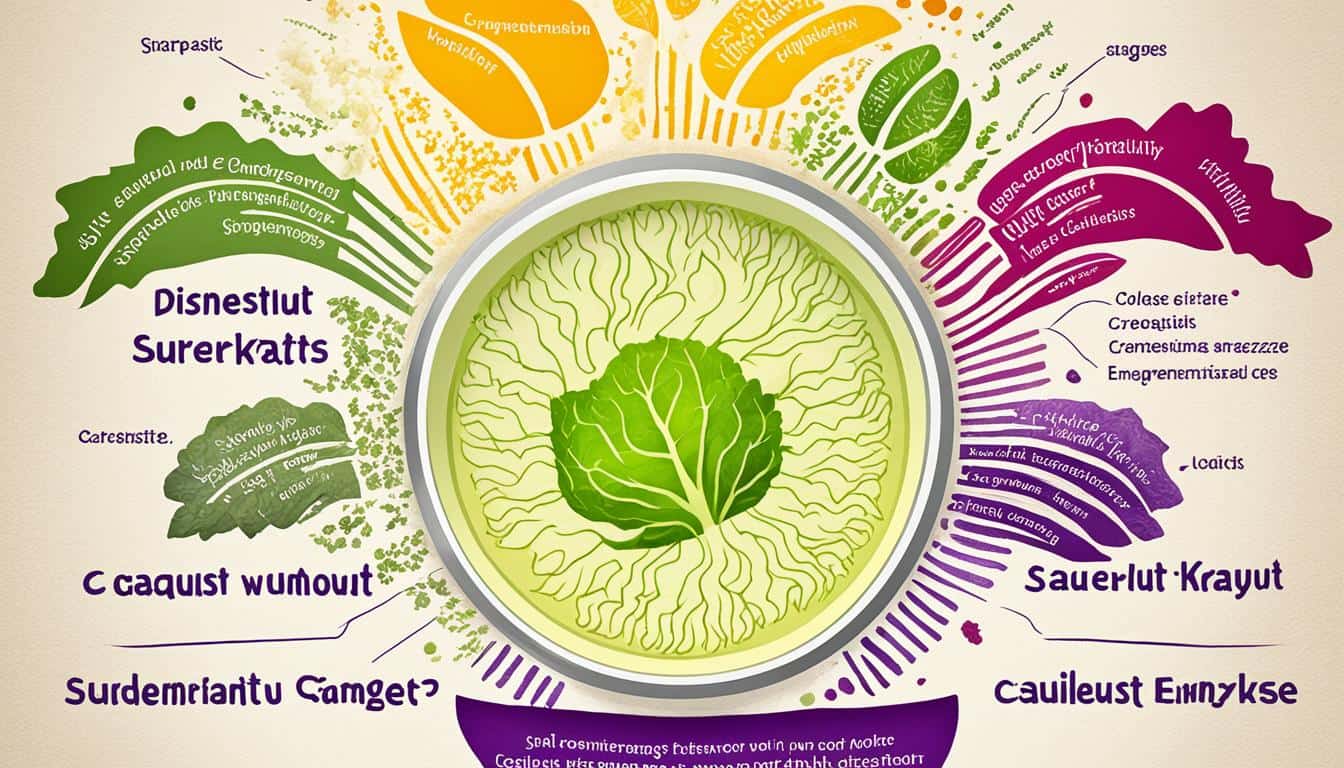
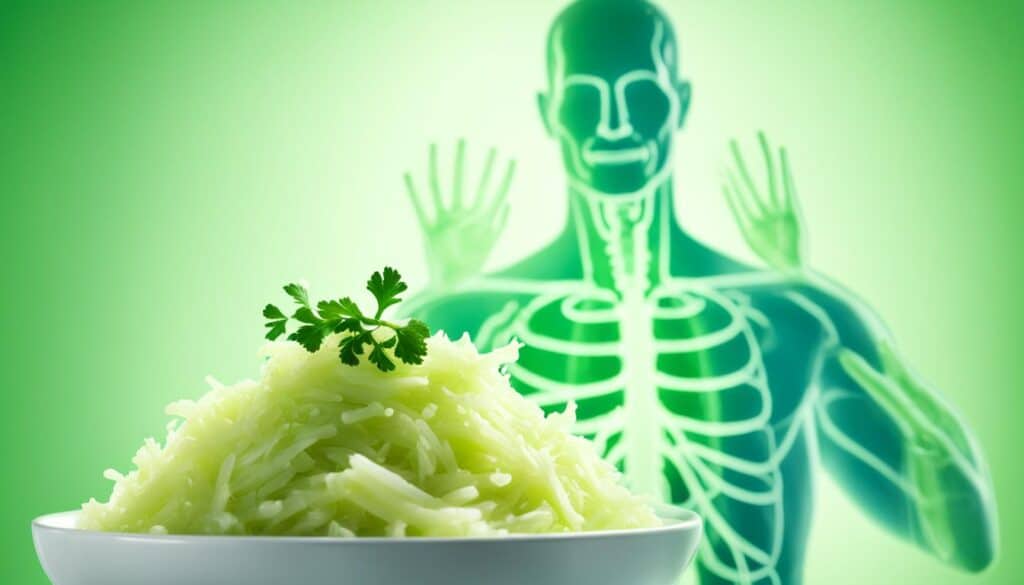

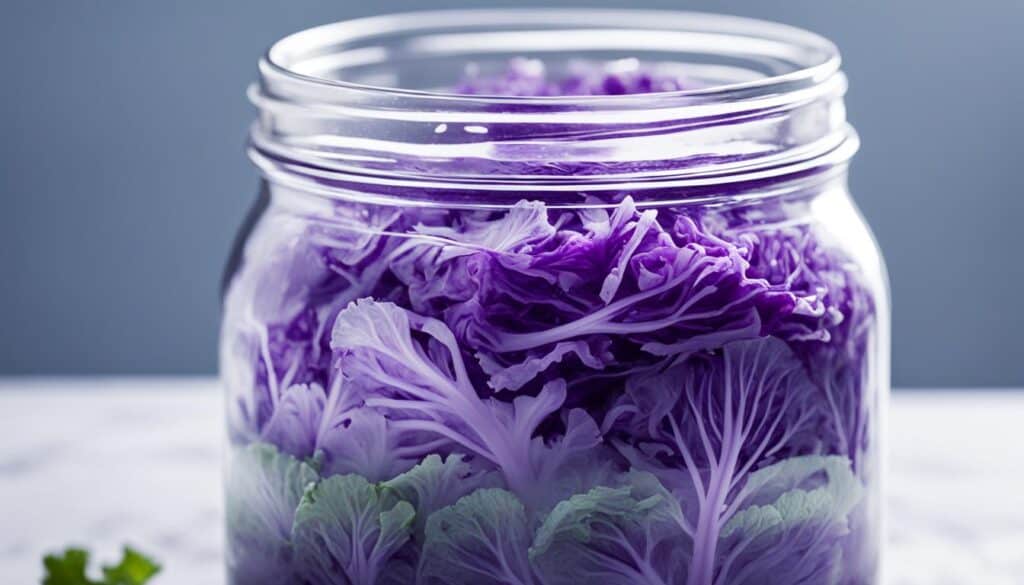
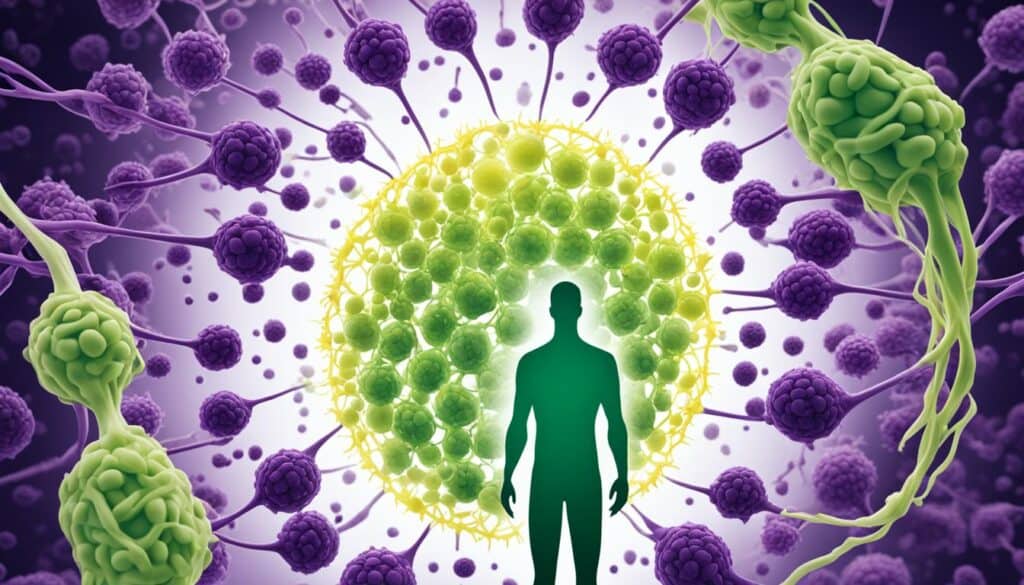
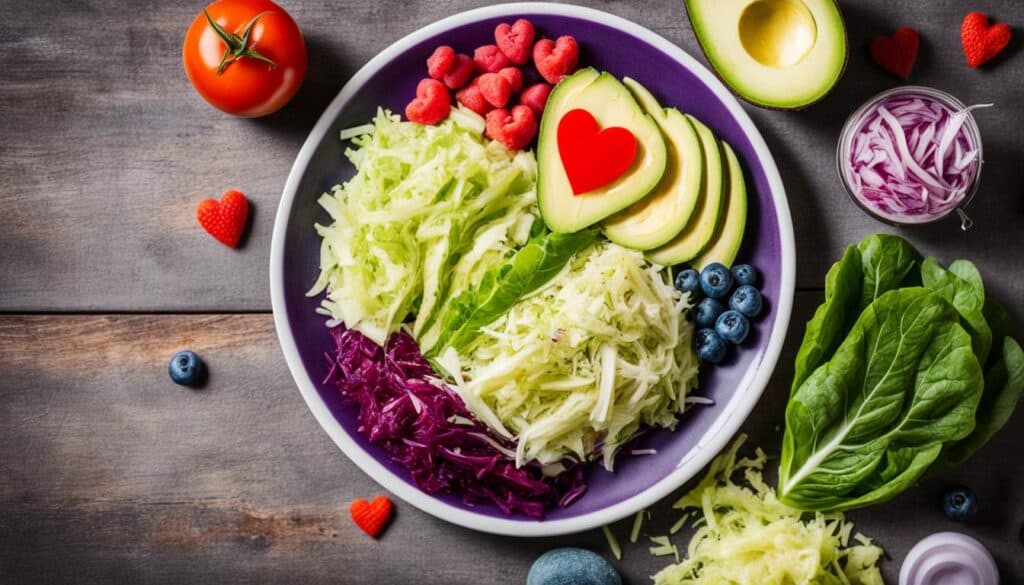



Leave a Reply